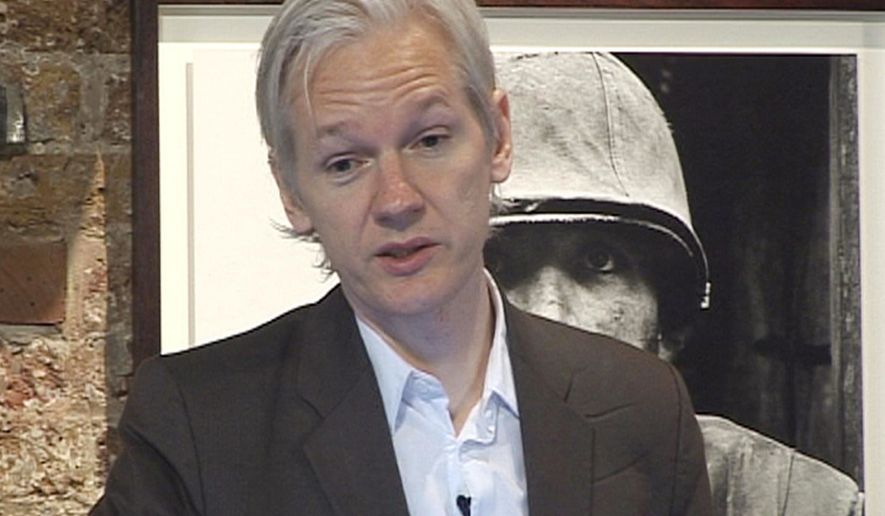WASHINGTON (AP) — The Pentagon said Monday it was trying to assess the damage caused by the Internet leak of some 91,000 classified documents on the Afghanistan war.
The documents are described as battlefield reports compiled by various military units that provide an unvarnished look at combat in the past six years, including U.S. frustration over reports that Pakistan secretly aided insurgents and civilian casualties at the hand of U.S. troops.
Wikileaks.org, a self-described whistleblower organization, posted the reports to its website Sunday night.
Col. Dave Lapan, a Defense Department spokesman, said the military would probably need “days, if not weeks” to review all the documents and determine “the potential damage to the lives of our service members and coalition partners.”
The White House said it didn’t try to stop news organizations who had access to secret U.S. military documents from publishing reports about the leaks. However, White House spokesman Robert Gibbs said it did ask Wikileaks — through reporters who were given advanced copies of the documents — to redact information in the documents that could harm U.S. military personnel.
The Pentagon declined to respond to specifics detailed in the documents, including reports of the Taliban’s use of heat-seeking anti-aircraft missiles.
“Just because they are posted on the Internet doesn’t make them unclassified,” Col. Lapan said.
The Pentagon said it still is investigating the source of the documents. The military has detained Bradley Manning, a former Army intelligence analyst in Baghdad, for allegedly transmitting classified information. But the latest documents could have come from anyone with a secret-level clearance, Col. Lapan said.
WikiLeaks founder Julian Assange promised on Monday that the release of documents — one of the largest unauthorized disclosures in military history — was just the beginning.
Mr. Assange told reporters in London that some 15,000 more files on Afghanistan were still being vetted by his organization.
He said he believed that “thousands” of U.S. attacks in Afghanistan could be investigated for evidence of war crimes, although he acknowledged that such claims would have to be tested in court.
Mr. Assange pointed in particular to a deadly missile strike ordered by Taskforce 373, a unit allegedly charged with hunting down and killing senior Taliban targets. He said there was also evidence of cover-ups when civilians were killed, including what he called a suspiciously high number of casualties that U.S. forces attributed to ricochet wounds.
The Defense Department declined to respond to specifics contained in the documents, citing security reasons.
But Col. Lapan said that coalition forces have made great strides in reducing the number of civilian deaths in Afghanistan.
James L. Jones, the White House national security adviser, said the release of the documents “put the lives of Americans and our partners at risk,” while Pakistan dismissed the documents as malicious and unsubstantiated.
Husain Haqqani, Pakistan’s ambassador to the United States, said the documents “do not reflect the current on-ground realities.” Islamabad’s Ministry of Foreign Affairs issued a similar statement, defending Pakistan’s intelligence agency, the ISI, against allegations it has supported insurgent networks.
“The people of Pakistan and its security forces, including the ISI, have rendered enormous sacrifices against militancy and terrorism,” the ministry wrote.
NATO refused to comment on the leak, but individual nations said they hoped it wouldn’t harm current operations in Afghanistan.
British Foreign Secretary William Hague said there has been significant progress recently in building up the Afghan state, “so I hope any such leaks will not poison that atmosphere.”
German Foreign Minister Guido Westerwelle warned about possible “backlashes” and urged all sides in Afghanistan to work toward national reconciliation.
Rep. Ike Skelton, Missouri Democrat, who chairs the House Armed Services Committee, said the documents reflect his view that U.S. war strategy was adrift last year, before President Obama’s decision to retool the war plan and add tens of thousands of U.S. forces.
Mr. Skelton warned Monday that the documents are outdated and “should not be used as a measure of success or a determining factor in our continued mission there.”
U.S. government agencies have been bracing for the deluge of classified documents since the leak of helicopter cockpit video of a 2007 fire fight in Baghdad. That was blamed on Mr. Manning, the 22-year-old Army intelligence analyst who was charged with releasing classified information earlier this month.
Mr. Manning bragged online that he downloaded 260,000 classified U.S. cables and transmitted them to Wikileaks.org.
Mr. Assange on Monday compared the impact of the released material to the opening of East Germany’s secret police files. “This is the equivalent of opening the Stasi archives,” he said.
He also said his group had many more documents on other subjects, including files on countries from across the globe.
“We have built up an enormous backlog of whistleblower disclosures,” he said.
Mr. Assange said he believed more whistle-blowing material will flood in after the publicity about the Afghan files.
“It is our experience that courage is contagious,” he said.
Associated Press writers Raphael Satter in London, Kimberly Dozier in Washington, Kirsten Grieshaber in Berlin and Robert Burns in Washington contributed to this report.




Please read our comment policy before commenting.